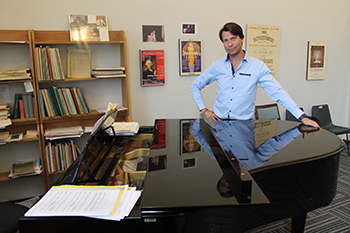
Albertus Engelbrecht believes that his predecessor
and mentor at the Odeion School of Music ,
Peet van Heerden, prepared him wonderfully for his task
as Vocals lecturer.
Photo: Jóhann Thormählen
He has captivated audiences from Berlin to Los Angeles with his singing talent for 17 years. Yet, teaching has always been in his genes, and as a child Albertus Engelbrecht dreamed about teaching music someday.
Once, when the opera singer stood on the Free State flats during his MMus studies at the University of the Free State (UFS), he knew this is where he would come.
He has been employed as Vocals lecturer at the Odeion School of Music (OSM) since 1 July 2016 and is now ploughing back his knowledge for students he believes have an incredible passion for singing that is not found even in European vocalists.
Concerts in Los Angeles stand out
Engelbrecht was a lyrical tenor at the Landestheater Niederbayern in Passau, Germany, and was working with students as well as professional singers (in Nürnberg and later Passau). However, he was bitten by the teaching bug much earlier. “When I was a student at Stellenbosch (where he obtained his BMus degree at Stellenbosch University), I discovered I had a love for vocals training,” he says.
He has performed all over Europe and worked with famous conductors such as Philipp Augin (Los Angeles Opera). “The most impressive performance was the New Year concerts in Los Angeles, and specifically the concert in the Walt Disney Concert Hall, with fantastic architecture by Frank Gehry, and housing approximately 2 260 people.”
“When I was a student at Stellenbosch, I discovered that I had a love for vocals training.”
Big boots to fill at OSM
He achieved his master’s degree magna summa Cum Laude at the UFS and received the Fanie Beetge prize for the best postgraduate student. He studied for his master’s degree under Peet van Heerden, with Dr Matildie Thom Wium as supervisor.
Following Van Heerden’s retirement, Engelbrecht had big boots to fill. “The most important thing that I learnt from him as mentor was that the instrument of a vocalist is also the body and soul of that individual – to be able to see the human standing, singing before me.”